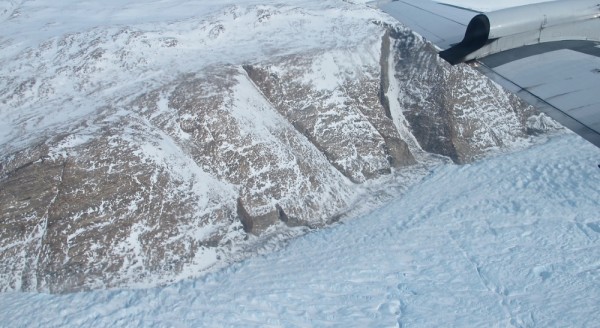By Ana Verayo, | September 27, 2016

An east Greenland glacier seen from the NASA P-3.
Climate scientists have recreated Earth's climate history spanning two million years. The researchers forecast that global temperatures will rise by at least three degrees Celsius to a maximum of seven degrees Celsius if greenhouse gas emissions continue at their current rate.
The new study is led by climate scientist Carolyn Snyder of Stanford University. The timeline created by the researchers can provide new insight into future climate trends and the long-term effects of global warming.
Like Us on Facebook
Past climate studies have covered a shorter period. However, this new climate timeline reconstruction spans the Ice Age cycles without any gaps and also captured the peaks and troughs of global temperature patterns over millennia.
This record includes global average temperatures and other crucial climate variables like polar region temperatures, carbon dioxide levels, and oxygen levels on the seabed.
These new findings suggest that an increase of the current greenhouse gas levels can result in a total warming of seven degrees Celsius of the planet in the next few thousands of years. This would also mean that ice sheets, vegetation, flora and fauna and atmospheric dust will respond to the effects of global warming.
Data for this new climate timeline was obtained as the team analyzed 59 layers of sediment samples taken from the ocean floor via drilling. These samples provided chemical clues from prehistoric climate changes, revealing evidence of extreme climate events for every layer.
With these ocean sediment cores, scientists have also determined 20,000 sea surface temperatures and reconstructed them. This was the basis of this timeline.
Researchers aim to not only accurately predict the future of climate change but also be able to explain how ice ages were vastly different from each other, occurring 41,000 years to 100,000 years.
Snyder adds that global cooling which stalled around 1.2 million years ago is also an effect of the shifting ice age cycles.
This new study has been published in the journal Nature.
-
Use of Coronavirus Pandemic Drones Raises Privacy Concerns: Drones Spread Fear, Local Officials Say

-
Coronavirus Hampers The Delivery Of Lockheed Martin F-35 Stealth Fighters For 2020

-
Instagram Speeds Up Plans to Add Account Memorialization Feature Due to COVID-19 Deaths

-
NASA: Perseverance Plans to Bring 'Mars Rock' to Earth in 2031

-
600 Dead And 3,000 In The Hospital as Iranians Believed Drinking High-Concentrations of Alcohol Can Cure The Coronavirus

-
600 Dead And 3,000 In The Hospital as Iranians Believed Drinking High-Concentrations of Alcohol Can Cure The Coronavirus

-
COVID-19: Doctors, Nurses Use Virtual Reality to Learn New Skills in Treating Coronavirus Patients








